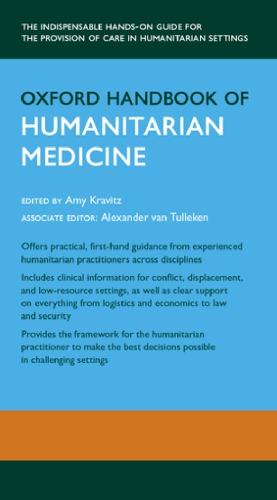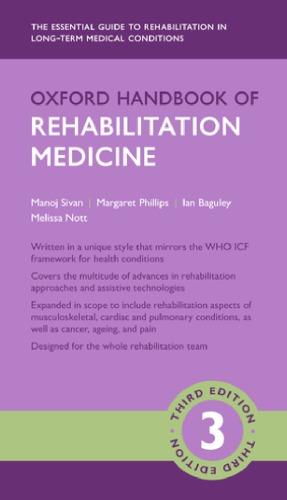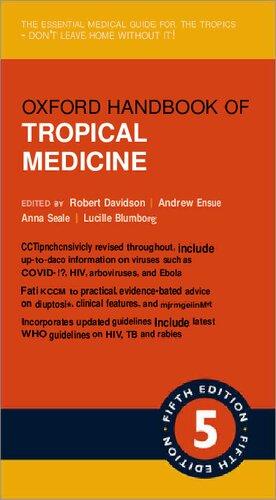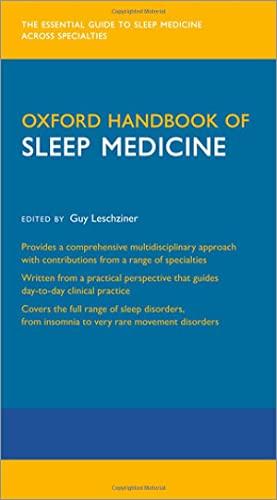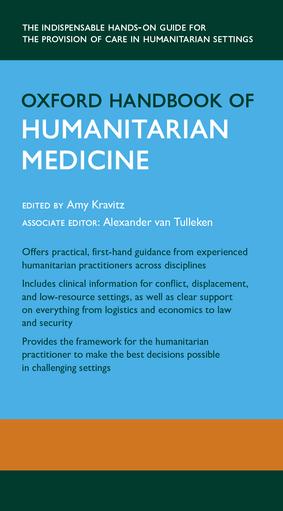Contributors
Tammam Aloudat
(Chapter 3: Health priorities in displacement; Chapter 46: Chronic non-communicable diseases)
Deputy Medical Director, Medical Department, Médecins
Sans Frontières, Geneva, Switzerland
Elizabeth Ashley (Chapter 29: Malaria)
Director of Clinical Research, Myanmar Oxford Clinical Research Unit, Yangon, Myanmar; Centre for Tropical Medicine and Global Health, University of Oxford, UK
Anne Aspler
(Chapter 25: Oedema)
Emergency Medicine, University of Toronto, Canada
Nathalie Avril
(Chapter 3: Health priorities in displacement)
Nutrition Advisor, Médecins Sans Frontières Operational Centre, Geneva, Switzerland
Marco Baldan
(Chapter 49: Medical management of the surgical abdomen)
General Surgeon, Delegate Regional Surgeon for the Near and Middle East, International Committee of the Red Cross, Beirut, Lebanon
Aaron L. Berkowitz
(Chapter 39: Neurology)
Director, Global Neurology Program, Brigham and Women’s Hospital, Boston, MA, USA
Associate Professor of Neurology, Harvard Medical School, Boston, MA, USA
Health and Policy Advisor in Neurology, Partners in Health, Boston, MA, USA
Catherine Berry (Chapter 34: Global impact of antimicrobial resistance)
Clinical Advisor, Médecins
Sans Frontières-UK, Chancery Exchange, London, UK
Massey Beveridge
(Chapter 49: Medical management of the surgical abdomen; Chapter 50: Wound care and minor surgical procedures; Chapter 51: Burns)
Adjunct Assistant Professor of Surgery, University of Toronto, Canada
Axel Bex (Chapter 40: Urology)
Urologic Surgeon, Division of Surgical Oncology, Department of Urology, Netherlands Cancer Institute, Amsterdam, Netherlands
Benjamin Oren Black
(Chapter 42: Obstetric care)
Obstetrician and Gynaecologist, London, UK Obstetric Technical Lead, UK-Med and UK
Emergency Medical Team, UK Association member, Médecins Sans Frontières-UK, London, UK
Laurent Bonnardot
(Chapter 45: Ear, nose, and throat)
ENT and Emergency Physician, Médecins Sans Frontières, Paris, France
Marie Claude Bottineau (Chapter 43: Neonatology)
Pediatrician and Neonatology, MSF International Pediatrics
Working Group Leader, MSF-CH Women & Children Health Pool Leader, Médecins sans Frontières
Operational Centre, Geneva, Switzerland
Françoise Bouchet-Saulnier
(Chapter 3: Health priorities in displacement; Chapter 9: International Law for Healthcare Workers)
Doctor of Law and Magistrate, International Legal Director of Médecins sans Frontières, Paris, France
Philippa Boulle
(Chapter 3: Health priorities in displacement; Chapter 37: Respiratory illness; Chapter 46: Chronic non-communicable diseases)
Chronic Non-Communicable Disease Advisor; Chronic Conditions Team Leader, Médecins sans Frontières, Geneva, Switzerland
Vincent Buard (Chapter 27: Diarrhoea and vomiting)
General Practitioner, Médecins Sans Frontières (MSF), Angers, France
Jorge Castilla Echenique (Chapter 4: Health systems design)
Senior Health Advisor, Emergency Operations, WHO Health Emergencies Programme, World Health Organization, Geneva, Switzerland
Vanessa Cavallera (Chapter 6: Mental health in humanitarian emergencies)
Independent Consultant
Kevin Chan (Chapter 19: Fever; Chapter 28: Malnutrition)
Chair, Pediatrics, Memorial University and Clinical Chief, Children’s Health, Eastern Health, St. John’s, Newfoundland, Canada
Bernard Chomilier
(Chapter 12: Medical logistics in humanitarian settings)
Logistics Expert, retired
Christine Chomilier (Chapter 12: Medical logistics in humanitarian settings)
Logistics Expert, retired
Iza Ciglenecki
(Chapter 3: Health priorities in displacement)
Operational Research Coordinator, Médecins Sans Frontières Operational Centre, Geneva, Switzerland
Gustavo Fernandez (Chapter 3: Health priorities in displacement)
Migration Senior Project Manager, Médecins Sans Frontières Operational Centre, Geneva, Switzerland
Deputy Head, Humanitarian Representation Team, Humanitarian Representative in Geneva, Médecins sans Frontières International
Sheri Fink
(Chapter 1: Introduction to humanitarian medicine)
Fellow, FXB Center for Health and Human Rights, Harvard T.H. Chan School of Public Health, Boston, MA, USA
Christos Giannou
(Chapter 15: Mass casualty triage)
Honorary Lecturer, Queen
Mary & Barts, Blizard Institute, University of London, UK
Former Head Surgeon, International Committee of the Red Cross, retired
Sarah Giles (Chapter 45: Ear, nose, and throat)
Assistant Clinical Professor, Department of Family Medicine, Faculty of Medicine, University of Ottawa, Ottawa, Canada. Member, Médecins sans Frontières, Canada
P. Gregg Greenough (Chapter 7: Epidemiology)
Assistant Professor, Global Health & Population, Harvard T.H. Chan School of Public Health; Faculty, Harvard Humanitarian Initiative, Cambridge, MA, USA
Andre Griekspoor
(Chapter 4: Health systems design)
Senior Humanitarian Policy Adviser, Emergency Operations, WHO Health Emergencies Programme, World Health Organization, Geneva, Switzerland
Monique Gueguen
(Chapter 54: Blood transfusion)
Medical Laboratory Advisor, Médecins sans Frontières, Paris, France
Jan Hajek
(Chapter 30: Neglected tropical diseases)
Clinical Assistant Professor, Department of Medicine, Division of Infectious Diseases, University of British Columbia, Vancouver, Canada
Ingo Hartlapp (Chapter 38: Gastrointestinal Illness)
Senior Physician, Specialist for Internal Medicine/ Gastroenterology/Infectiology/ Oncology, Würzburg University Hospital, Germany
Member, Médecins sans Frontières Telemedicine Program, Germany
Laura Hawryluck (Chapter 18: Shock)
Associate Professor Critical Care Medicine, University of Toronto, Canada
Physician Lead, Critical Care Rapid Response Team, University Health Network, Toronto, Canada
Member, Médecins Sans Frontières Telemedicine Program, Canada
Laurent Hiffler (Chapter 17: Approach to paediatric care)
Paediatric Advisor, MSF Operational Center, Barcelona, Athens, Dakar, Senegal
Chris Houston (Chapter 10: Security)
Senior Program Officer (Humanitarian), Grand Challenges Canada
Board member, Médecins sans Frontières, Canada
Module Lead, Global Health Education Initiative, Postgraduate Medical Education, University of Toronto, Canada
Tim Jagatic
(Chapter 32: Clinical suspicion of Ebola)
Physician, Médecins Sans Frontières, Ontario, Canada
Kiran Jobanputra
(Chapter 3: Health priorities in displacement)
Head of Manson Unit, Médecins Sans Frontières, London, UK
Lynne Jones (Chapter 6: Mental health in humanitarian emergencies)
Fellow, FXB Center for Health and Human Rights, Harvard University, Boston, MA, USA
Honorary Consultant Child and Adolescent Psychiatrist, Cornwall Partnership NHS Foundation Trust, Cornwall, UK and South London and Maudsley NHS Foundation Trust, London, UK
Jaap Karsten (Chapter 17: Approach to paediatric care)
Médecins Sans Frontières, Amsterdam, The Netherlands
Saleem Kassam
(Chapter 36: Cardiac conditions)
Consultant, Director, Cardiac Catheterization Laboratory, Rouge Valley Health System, Toronto, Canada
Vice President, Médecins Sans Frontières, Canada
Jocelyn T.D. Kelly
(Chapter 5: Gender-based violence in humanitarian crises)
Director, Women in War Program, Harvard Humanitarian Initiative, Cambridge, MA, USA
Hyo Jeong Kim
(Chapter 4: Health systems design)
Technical Officer, Emergency Operations, WHO Health Emergencies Programme, Geneva, Switzerland
Cara Kosack
(Chapter 53: Laboratory; Chapter 54: Blood transfusion)
Leader, Diagnostic Network, Médecins sans Frontières, Amsterdam, The Netherlands
Alena Koscalova
(Chapter 3: Health priorities in displacement)
Tropical Medicine Adviser, Médecins sans Frontières, Operational Centre, Geneva, Switzerland
Amy S. Kravitz
(Chapter 1: Introduction to humanitarian medicine)
Medical Officer, United States Agency for International Development (USAID), Washington, DC, USA
W. Ted Kuhn (Chapter 55: Ultrasound)
Former Director, International Medicine, Co-director, Ultrasound Fellowship, Medical College of Georgia, Augusta University, GA, USA
Kenneth Lavelle
(Chapter 11: Medical care under fire: a perspective from the international medical organization Médecins Sans Frontières)
Deputy Director of Operations, Médecins Sans Frontières, Geneva, Switzerland
Matthew Lyon (Chapter 55: Ultrasound)
Executive Director, Center for Ultrasound Education, Medical College of Georgia, Augusta University, GA, USA
Anna MacDonald (Chapter 23: Lymphadenopathy)
Emergency Physician, St Michael’s Hospital, North York General Hospital, Toronto, Canada
Peter Maes (Chapter 56: Water, sanitation, and hygiene; Chapter 57: Medical waste management)
Water, Hygiene and Sanitation Unit Coordinator, Water, Hygiene & Sanitation Unit, Médecins Sans Frontières – O.C. Brussels, Belgium
Olivier Malard (Chapter 45: Ear, nose, and throat)
ENT – Head and Neck Surgery Department, Centre Hospitalier Universitaire de Nantes, France
William Mapham (Chapter 44: Ophthalmology)
Ophthalmologist, Stellenbosch University, South Africa
Daniel Martinez Garcia (Chapter 17: Approach to paediatric care)
Paediatric Advisor, Medical Department, Médecins Sans Frontières, OCG Women & Child Health Unit, Geneva, Switzerland
James Maskalyk (Chapter 26: Patient with unintentional weight loss)
Emergency Physician, Assistant Professor, University of Toronto, Canada
Pierre Maury (Chapter 3: Health priorities in displacement)
Médecins Sans Frontières, Geneva, Switzerland
Camille Michel (Chapter 11: Medical care under fire: a perspective from the international medical organization Médecins Sans Frontières)
Legal Advisor for International Humanitarian Law and Medicolegal Issues, Médecins Sans Frontières, Geneva, Switzerland
Rose Leonard Molina (Chapter 5: Gender-based violence in humanitarian crises)
Assistant Professor of Obstetrics, Gynecology and Reproductive Biology, Harvard Medical School, Boston, MA, USA
Faculty Physician, Division of Global and Community Health, Department of Obstetrics and Gynecology, Beth Israel Deaconess Medical Center, Boston, MA, USA
Associate Scientist, Division of Women’s Health, Brigham and Women’s Hospital, Boston, MA, USA
Peter Moons (Chapter 16: Medical triage; Chapter 27: Diarrhoea and vomiting)
Consultant Paediatrician, Academic Pediatric Center Suriname, Paramaribo, Suriname
Lily Muldoon (Chapter 20: Anaemia)
Emergency Medicine Resident, Department of Emergency Medicine, University of California San Francisco, CA, USA
Veronique Mulloni
(Chapter 3: Health priorities in displacement)
Water, Hygiene and Sanitation Technical Referent, Technical Support to the Operations, Médecins Sans Frontières, Geneva, Switzerland
Aditya Nadimpalli
(Chapter 37: Respiratory illness)
Primary Care Ultrasound Fellow, School of Medicine, University of South Carolina, Columbia, SC, USA
Thomas Nierle
(Chapter 11: Medical care under fire: a perspective from the international medical organization Médecins Sans Frontières)
Former President, Médecins Sans Frontières, Geneva, Switzerland
David Nott (Chapter 48: Major trauma)
Consultant Surgeon, Imperial College, London, UK
Dirk-Jan Omtzigt
(Chapter 8: Understanding economic effects of humanitarian intervention)
Analyst, UNOCHA Regional Office for Southern and Eastern Africa
Joseph O’Neill (Chapter 21: Pain; Chapter 24: Cough and breathlessness; Chapter 47: Palliative care)
Palliative Medicine, University of Maryland/Shore Regional Health, Easton, MD, USA
James Orbinski (Humanitarianism Today) Professor and Director, Dahdaleh Institute for Global Health Research, York University, Toronto, Canada
Susan Ann O’Toole (Chapter 42: Obstetric care) Obstetrician-Gynaecologist, Collingwood, ON, Canada
AnneMarie Pegg (Chapter 35: Response to epidemic disease)
Clinical Lead, Epidemic Response and Vaccination, Médecins Sans Frontières, Paris, France
Associate Clinical Faculty, University of Calgary, Department of Family Medicine, Calgary, Canada
Max Ritzenberg (Chapter 20: Anaemia)
Clinical Instructor, Department of Emergency Medicine, Faculty Affiliate, Institute for Global Health Sciences, University of California, San Francisco, CA, USA
Patrick Robitaille (Chapter 2: Responders and responses)
Independent Consultant
David Rowley (Chapter 52: Orthopaedics and limb injuries)
Emeritus Professor, University of Dundee, UK
Monica Rull (Chapter 3: Health priorities in displacement)
Operations Health Coordinator Médecins Sans Frontières, Geneva, Switzerland
Margaret Salmon (Chapter 20: Anaemia)
Director and Innovator at InnovationsCZ, Attending: Valley Emergency Physicians, San Francisco, CA
Peter Saranchuk
(Chapter 31: Tuberculosis and HIV in humanitarian contexts)
TB/HIV Adviser, Southern Africa
Medical Unit (SAMU), Médecins Sans Frontières, Cape Town, South Africa
Medical Technical Advisor, Seva Foundation, Berkeley, USA
Practicing Clinician, Bridges Community Health Centre, Fort Erie, Canada
Elisabeth Sauvaget (Chapter 45: Ear, nose, and throat)
Chief of ENT – Head and Neck surgery department, Hôpital Saint Joseph, Paris, France
Laura Sauve (Chapter 19: Fever)
Pediatric Infectious Diseases
Specialist, BC Children’s Hospital; Clinical Assistant Professor, Division of Infectious Diseases, Department of Pediatrics, University of British Columbia, Vancouver, Canada
Jennifer Scott
(Chapter 5: Gender-based violence in humanitarian crises)
Director, Division of Global and Community Health, Department of Obstetrics and Gynecology, Beth Israel Deaconess Medical Center, Boston, MA, USA
Associate Scientist, Division of Women’s Health, Brigham and
Women’s Hospital, Boston, MA, USA
Instructor, Harvard Medical School, Boston, MA, USA
Norman Sheehan (Chapter 10: Security)
Risk Management Consultant
Jonathan Spector (Chapter 43: Neonatology)
Executive Director, Global Health, Novartis Institutes for BioMedical Research, Cambridge, MA, USA
Craig Spencer (Chapter 32: Clinical suspicion of Ebola)
Director of Global Health in Emergency Medicine, New York-Presbyterian/ Columbia University Medical Center, New York, NY, USA
Assistant Professor of Medicine and Population and Family Health, Columbia University Medical Center, New York, NY, USA
Miroslav Stavel (Chapter 18: Shock)
Staff Paediatrician and Neonatologist, Royal Columbian Hospital, New Westminster, Canada
Marianne Stephen (Chapter 41: Reproductive health)
Specialist Registrar Obstetrics and Gynaecology; Field Doctor, Médecins Sans Frontières
Ana Maria Tijerino (Chapter 3: Health priorities in displacement)
Mental Health Advisor, MSFCH –Médecins Sans Frontières, Geneva, Switzerland
Sandrine Tiller (Chapter 2: Responders and responses)
Strategic Adviser, Médecins Sans Frontières, London, UK
Michelle Tubman (Chapter 22: Jaundice)
Attending Physician, Emergency Medicine, Alberta Health Services, Edmonton, Canada
Clinical Lecturer, Department of Emergency Medicine, University of Alberta, Edmonton, Canada
Jennifer Turnbull (Chapter 15: Mass casualty triage; Chapter 28: Malnutrition; co-editor of Chapter 1: Introduction to humanitarian medicine; Chapter 3: Health priorities in displacement
Attending Physician, Division of Pediatric Emergency Medicine, McGill University Health Centre, Montreal Children’s Hospital, Canada
Assistant Professor, Department of Pediatrics, McGill University, Montreal, Canada
Rafael Van den Bergh (Chapter 56: Water, sanitation, and hygiene; Chapter 57: Medical waste management)
Senior Operational Research and Technical Support Officer, LUX-OR, Médecins Sans Frontières Operational Centre, Brussels, Belgium
Joos Van den Noortgate (Chapter 56: Water, sanitation, and hygiene; Chapter 57: Medical waste management)
Responsible Innovation & Training, Water, Hygiene & Sanitation Unit, Médecins Sans Frontières Operational Centre, Brussels, Belgium
Peter Ventevogel
(Chapter 6: Mental health in humanitarian emergencies)
Senior Mental Health Officer, UNHCR, Geneva, Switzerland
Raghu Venugopal (Chapter 14: Approach to clinical care in humanitarian contexts); Chapter 27: Diarrhoea and vomiting)
Médecins Sans Frontières Telemedicine Coordinator
Assistant Professor of Medicine, University of Toronto, Canada
Attending Physician, Department of Emergency Medicine, University Health Network, Toronto, Canada
Isabelle Voiret (Chapter 3: Health priorities in displacement)
Médecins Sans Frontières, Geneva, Switzerland
Rod Volway (Chapter 13: Working for international organizations)
Humanitarian Development
Professional
David A. Warrell
(Chapter 33: Venomous animal bites and stings and marine poisoning
Emeritus Professor of Tropical Medicine and Honorary Fellow of St Cross College, University of Oxford, UK
Inka Weissbecker (Chapter 6: Mental health in humanitarian emergencies)
Senior Global Mental Health and Psychosocial Support Advisor, International Medical Corps, Washington, DC, USA
Andrew James Willis (Chapter 7: Epidemiology) Epidemiologist, Médecins Sans Frontières, Montreal, Canada
ESymbols and abbreviations
cross-reference
M website
± with or without
i increased
d decreased
~ approximately
ACT artemisinin-based combination therapy
AEC antiepileptic drug
AFB acid-fast bacilli
AIDS acquired immunodeficiency syndrome
ALT alanine transaminase
AMI acute myocardial infarction
AP Additional Protocol
ART antiretroviral therapy
AST aspartate transaminase
ATFC ambulatory therapeutic feeding centre
ATLS® Advanced Trauma Life Support®
AVPU alert, voice, pain, unresponsive
BCG bacillus Calmette–Guérin
BEmONC basic emergency obstetric and newborn care
BMI body mass index
BPD biparietal diameter
BPH benign prostatic hyperplasia
bpm beats per minute
CAD coronary artery disease
CCm cryptococcal meningitis
CDC Centers for Disease Control and Prevention
CEmONC comprehensive emergency obstetric and newborn care
CFR case-fatality rate
CHB chronic hepatitis B
CHC chronic hepatitis C
CHF congestive heart failure
CHW community health worker
CMV Cytomegalovirus
CNS central nervous system
COPD chronic obstructive pulmonary disease
CrAg cryptococcal antigen
CS caesarean section
CSF cerebrospinal fluid
CVP central venous pressure
DHMT district health management team
DIC disseminated intravascular coagulation
DKA diabetic ketoacidosis
DPT diphtheria, pertussis, and tetanus
DR-TB drug-resistant tuberculosis
DST drug susceptibility testing
DVT deep vein thrombosis
EBV Epstein–Barr virus
EC emergency contraception
ECG electrocardiography/electrocardiogram
EEG electroencephalography
EHEC enterohaemorrhagic Escherichia coli
EP ectopic pregnancy
EPI Expanded Programme on Immunization
EPTB extrapulmonary tuberculosis
ETAT Emergency Triage, Assessment, and Treatment
EU European Union
EWARS early warning alert and response system
FAST focused assessment with sonography in trauma
FEV1 forced expiratory volume in 1 second
FGC female genital cutting
FGM female genital mutilation
FNA fine-needle aspiration
FVC forced vital capacity
G6PD glucose-6-phosphate dehydrogenase
GAM global acute malnutrition
GBV gender-based violence
GCS Glasgow Coma Scale
GFR glomerular filtration rate
GI gastrointestinal
GN glomerulonephritis
GNI gross national income
HAT human African trypanosomiasis
Hb haemoglobin
HbA1c glycated haemoglobin
HBsAG hepatitis B virus surface antigen
